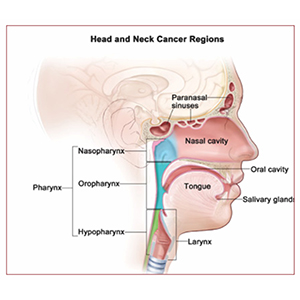Head and Neck Cancer
01. What is Head & Neck cancer?
Head & Neck is a group of cancers that starts within the mouth, nose, throat, larynx, sinuses, or salivary glands. About 80% of head and neck cancer is due to the use of alcohol or tobacco. Because head and neck cancer involves the digestive and respiratory tracts, tumors – if left untreated – can interfere with eating, swallowing, and breathing, and can invade other parts of the body. The larger a tumor becomes, the more life-threatening it is.
02. What are the symptoms of Head & Neck cancer?
- Swelling or sore that does not heal
- Red or white patch in the mouth
- Lump, bump, or mass in the head or neck area, with or without pain
- Persistent sore throat
- Foul mouth odor not explained by hygiene
- Hoarseness or change in voice
- Nasal obstruction or persistent nasal congestion
- Frequent nose bleeds and/or unusual nasal discharge
- Difficulty breathing
- Numbness or weakness of a body part in the head and neck region
- Pain or difficulty chewing, swallowing, or moving the jaw or tongue
- Blood in the saliva or phlegm
- Loosening of teeth / Denture
- Persistent Earache
- Unexplained weight loss
03. Are you at risk for getting Head & Neck cancer?
If you notice any of the following head and neck cancer symptoms, it is important to notify your physician immediately. Early detection and treatment are paramount and key to your good health. Other risk factors that contribute to head and neck cancer include following things.
- Poor oral hygiene
- Ill-fitting dentures
- Chronic iron deficiency
- Alcohol & Tobacco Chewing
- Injury due to sharp teeth
- Occupational hazards such as wood dust inhalation and nickel exposure

04. How often you should be screened for Head & Neck cancer?
Head and neck cancer is often difficult to diagnose early because many people only experience mild symptoms. That is why it is so important to see your physician and dentist regularly, especially if you are a smoker or drinker. Three-quarters of all oral cancers can be seen or felt in a physical examination by your physician and many cancerous lesions are detected by dentists. Cancer of the nasal passageways or middle ear may be more difficult to detect.
05. What are the treatments for Head & Neck cancer?
If you are suffering from Head and Neck cancer than in addition to a thorough physical examination, your physician also uses blood tests, imaging techniques such as x-rays and Magnetic resonance (MRI), OPG, CT Scan, PET scan, Endoscopy and biopsy to make an accurate diagnosis and develop the most appropriate treatment plan.
Successful treatment for Head and Neck cancer involves below mentioned treatments. To make an informed choice, ask about the pros and cons of each option, potential side effects, and how effective the treatment is likely to be.
- Surgery
- Radiation therapy
- Chemotherapy
- Any combination of the three
In addition to tumor removal, other goals of successful treatment include restoration of swallowing, eating and speaking functions. Plastic surgery will be needed and speech therapy are sometimes required for cosmetic and functional reasons after surgical removal of Head and Neck tumors





